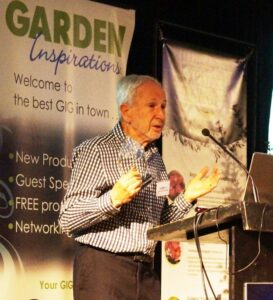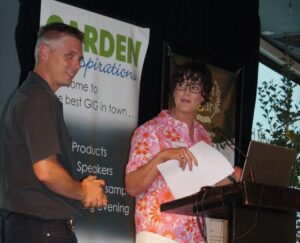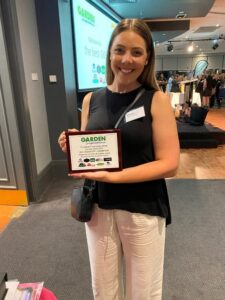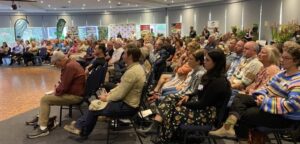
Support for garden centres highlights GIG 2025
By John Fitzsimmons
2025 has marked a watershed year for the Garden Inspirations Group (GIG) with even more sponsor-partners, record attendance in Melbourne by garden centre owners and staff from across Victoria, as well as visitors from NSW, South Australia and Western Australia, and a milestone 30th birthday.
A notable theme running through this year’s presentations was the reinforcement of support and resources for garden centres and their staff from the GIG network partners. This ranged from changes to logistics and ordering processes to updated marketing and point-of-sale tools and even broader invitations to visit production nurseries and allied industry showrooms and warehouses. There was a history of putting various suppliers in context and providing trade buyers with confidence to source from the GIG network and, naturally, some new and forthcoming plant releases.
The 2025 Plant of the Year – Hydrangea ‘Runaway Bride’ was announced – the first Garland Hydrangea, noted for its elegant weeping habit and profusion of white lace-cap flowers along the stems, thriving across various conditions and requiring no pruning. Plants Management Australia-PMA is the exclusive partner in Australia for this innovative variety.
Olivia and Andrew Jones of Poynton’s Nursery received the GIG Champion Award for 2025 in recognition of industry service. GIG’s own Leigh Siebler was recognised by his peers for his three decades of service to the GIG project and five decades of involvement in the horticulture sector, starting at Ashburton Nursery and subsequently working for Plants Plus, Paramount Nursery, Greenworld magazine, David Austin Roses, Garden Centres of Australia, and others.
The GIG network now involves Biemond Nurseries, Bombora Pots, Grow Better, PGA (Plant Growers Australia), Takasho, Trenton Cottage, Ausflora Pacific, Scotsburn Nurseries, and Nursery & Garden Industry Victoria (NGIV).
Speaking at his 10th GIG, indoor plant specialist, Steve Biemond highlighted his family’s 40 years in the industry and its progress to two production sites, a new depot in South Australia, and an improved logistics system to reduce reliance on third-party carriers. A number of lines are also being reintroduced to Biemonds’ range in 2025 including guzmanias, vrieseas, rhipsalis, ponytail palms, Strelitzia (Bird of Paradise), Pilea repens ‘Moon Valley’ and Dracaena fragrans (Happy Plants). Super-robust Davana and super -hardy Zanzibar Gem ‘Jungle Warrior’ (low – almost no – water requirements with black mature foliage when kept dry and light green new foliage) are also on the 2025 lists.

Bombora/Grow Better’s Mike Donsen announced refreshed new packaging, new recipe potting mixes with more coir content, two seed raising mix options (Professional and Organic), and special buying deals on pots including the Maya range and Sierra cylinders. The company now distributes Harry’s Fertilisers (including special blends for camellia, gardenia, roses, daphne and citrus), and Phostrogen. Buyers were urged to visit the company’s warehouse and showroom to fully appreciate the company’s enlarged and growing range.
Ausflora Pacific’s Sarah Burgess presented a quick primer and revision session on their specialty – Proteaceae – what they are, where they come from and how to grow them well. This highly popular family includes 14 Genera with 360 species from South Africa (including protea, leucadendron, leucospermum and others) and 45 Genera with 800 species from Australia (notably, telopea, banksia, grevillea, hakea, adenanthos and macadamia).
She explained how most Proteaceae:
- need full sun or at least 6 hours per day, preferably in the afternoon. “More sun = more flowers”
- prefer well drained soil; heavy clays are best avoided
- grow best with a pH 5.5 to 6. While they will tolerate a neutral pH (pH 7), higher pH “will not be appreciated”
- tolerate a little frost – down to -2oC, even lower for some species
- need water twice weekly in the first summer, then less (or as required) once established. Even in pots good drainage is essential with ‘small daily drinks’ through summer and ‘as required’ during winter (Sarah recommends using a quality soil moisture meter)
- will respond to pruning but try to leave non-flowering stems as they are next year’s flowers. Prune older plants in stages removing no more than 40% leaf cover at a time (except King Protea and telopea which can be taken down almost to ground level)
- find the most common problems are being ‘loved to death”, over-watering, insufficient sunlight, and inappropriate soil pH

Fred De Haan from Takasho introduced the GIG attendees to a new tool for garden centres to optimise their ordering and stocking of items from the company’s offering. Referred to as RAPT (Range Assistance Program Takasho) it is a data-driven app that compares a garden centre’s purchasing, stocking and retail sales of Takasho lines with that company’s broader detailed data on sales patterns and volumes. This can help the garden centre take better advantage of sales trends and patterns based on product categories, seasonal trends and national or regional movements.
As an example, a garden centre could be made aware of potential opportunities for increased sales of pots or other allied lines if a different size, colour or material was stocked. A product not stocked by a retailer could be, in fact, a high-volume seller in Takasho’s experience. RAPT is one of many tools being made available by suppliers to help and support their customers’ mutual business growth.
Similarly, PGA’s (Plant Growers Australia) Sophie Bult highlighted point-of-sale support for garden centres including tubs, labels, flags, banners and availability of staff for staff training, and talks to customer groups and garden clubs. Special attention has been given to enhancing information on PGA’s greenlife offering and how to realise its best potential through social media channels; this includes a new practical ‘how to’ series presented by GIG MC Chloe Thomson of beantheredugthat.com
And it would not be a PGA presentation without a few innovations. This year their new introductions included:
- Salvia ‘Dappled Delight’
- Helleborus Frostkiss®
- Anemone ‘Satin Doll’
- Carpentaria ‘Californian Snow’
- Fuchsia ‘Happy Bells’ range
- Lavandula ‘The King’
Trenton Cottage’s Debra Griffin summarised their new 2025 bulbs-flowers and produce-edibles catalogues. New introductions to the former included:
- Daffodil ‘Mini Tete Boucle’, ‘Bittern’, ‘Loveday’, ‘Calgary’, ‘Pimpernel’, ‘Neon’, ‘High Society’ and ‘Virginia Sunrise’
- Jonquil ‘Avalanche’
- Freesia ‘Parigo Giant Pink Devotion’
- Tulip ‘Cabanna’ and ‘Pink Ardour’
- Hyacinth Sweetheart blend
- Anemone Cottage Poppy Mixed
- New Calla lilies (‘Grape Velvet’ and ‘Orange Pride’)
- New Dahlias (‘Cafe Au Lait’, ‘Cornflakes’ and ‘Homicide’)
Horseradish and wasabi were added to Trenton’s ‘produce & edibles’ catalogue, and a new ‘orange’ price point ($11.00 RRP incl GST) was announced.
As many others did this year, Trenton Cottage also introduced a new versatile flatpack POS display, which costs less to freight than the previous wooden version.
2025 also marked the 30th anniversary of the iconic Wollemi pine coming to market in 1994. The Wollemi pine is also under Trenton Cottage’s custodianship so appropriate anniversary POS materials including badges and certificates are available to retailers.
New GIG member Scotsburn Nurseries made their debut presentation through Peter Douglas, marking the business’s 95th birthday! Peter recapped the enterprise’s proud history starting in 1932 with the respected Fred Linton (later to become Mayor of the City of Oakleigh, now part of the City of Monash), who started with a block on the Scotsburn Estate in South Oakleigh growing herbs, vegetables and cut flowers in-ground (even tobacco in 1932!). In 1932 Fred employed 17-year-old David Wood (Peter’s maternal grandfather) as his ‘market man’ in the Queen Victoria Market. In 1945, the business, including the land and Victoria Market lease, was sold to David. Fred continued to establish the Golf Links Nursery and employed a young John van der Horst of Acorn Nursery, famed for his first job in horticulture. David Wood’s brother Harry ran the nursery while another Wood brother, Maurie, ran Woodland Nursery for many years. Fred Wood also ran a seedling nursery while brother Wally was a florist.

They supplied commercial vegetable growers, Coles variety stores, Kmart, retail nurseries and florists.
In 1985 David retired and Rod Dawson was employed as manager.
As Peter Douglas left school, his parents asked what he was going to do with himself, and he responded, “The nursery industry looks interesting.” After studying at Burnley and travelling and working overseas, Peter returned and joined the family business. He said it took 20 years to rebuild the seedling nursery, only to run into the Millennium drought, “and we were back where we started, unfortunately.”
As an enthusiastic reader of business books, Peter then quoted author Jim Collins, who suggested “do what you love and do what you’re good at (and) write yourself a ‘stop doing’ list”. What we stopped doing was selling to corporates and focusing on the independent retail sector, commercial landscapers and commercial vegetable growers back in 2013, Peter recalled.
“Our focus on the independents means we have become very focused on what we do. We find products from new; we don’t look for more customers to buy our seedlings – we grow what our customers want. And we avoid direct competition with ‘big box’ retailers.”
The GIG 2025 business presentations concluded with NGIV’s (Nursery & Garden Industry Victoria) debut through Chief Executive Craig Taberner. NGIV represents the interests of the Victorian horticulture industry, a sector worth over $2.5 billion that employs more than 24,100 people. Within Victoria, NGIV advocates on behalf of over 1500 committed horticultural business members. Craig highlighted how NGIV aims to “protect and build” the industry, inform, educate and grow, and save members time and money through its services and activities.
